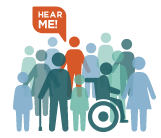Can you hear us now? (2023-2028)
| STUDY # | WHAT | HOW | TIMELINE |
|---|---|---|---|
| Study 1 | We will improve our clear language health survey to give adults with intellectual disability (ID) a way to share their health needs with professionals, like therapists, doctors, and counselors. | – Work with our research partners to look at past survey results and make some changes that will improve how it works
– Give the updated health survey to 50 adults with ID to see how the survey helped them report their health needs to professionals. – Give the updated health survey to 500 college students to see how the survey works across different populations of people. |
2023-2028 |
| Study 2 | We will learn more about how many adults with ID also have mental health needs. | – Ask adults with ID across the United States questions about their health and wellbeing (i.e., interviews; clear language survey)
– Work with our research partners, including the DEEP, REEP, and Special Olympics, to include adults with ID from different backgrounds, cultures, and races. – Work with our research partners to look at past results and new results, in order to share how many adults with ID also reported mental health needs. |
2025-2028 |
| Study 3 | We will make a mental health therapy treatment for adults with ID who worry a lot of the time or have anxiety. | – Look at current research on mental health therapy for people with ID and make a treatment plan
– Give the research-based treatment to small groups of adults with ID and see how it works – Use what we learn to teach professionals how to use the group therapy when they are treating adults with ID |
2023-2028 |
| Study 4 | We will set-up a system to learn more about the health and needs of adults with ID over time. | – Work with partners to make a long-term plan to collect health and community living information from people with ID. | 2023-208 |
Can you hear me now? (2018-2023)
| STUDY # | WHAT | HOW | TIMELINE |
|---|---|---|---|
| Study 1 | Give adults with intellectual disability (ID) a way to share their health needs with professionals, like therapists, doctors, and counselors. | – Work with our disability and research experts to make health surveys easier to use and understand
|
2018-2020 |
| Study 2 | Find out how many adults with ID also have mental health needs. | – Give health surveys to adults with ID across 5 states
– Continue testing surveys from Study 1 with adults with ID from 5 states to see if they are working well – Some people will also interview with a doctor. This will help us to see if our surveys are giving us the right information about the health needs of people with ID |
2021-2024 |
| Study 3 | Make treatment guidelines for mental health professionals, like doctors, counselors, and therapists. | – Look at current research on mental health treatment for people with ID
– Talk with people with ID and mental health professionals to find out which factors of therapy & treatment are helpful – Use what we learn to make guidelines for professionals to use when they are treating people with ID |
2018-2023 |

